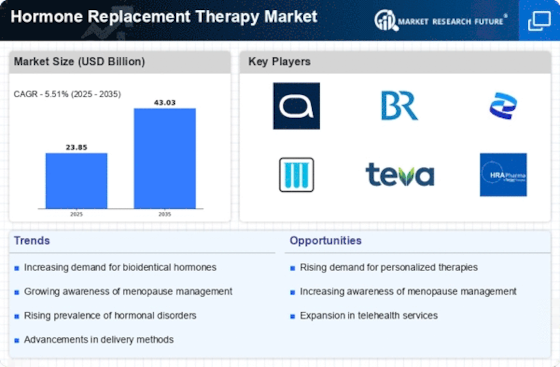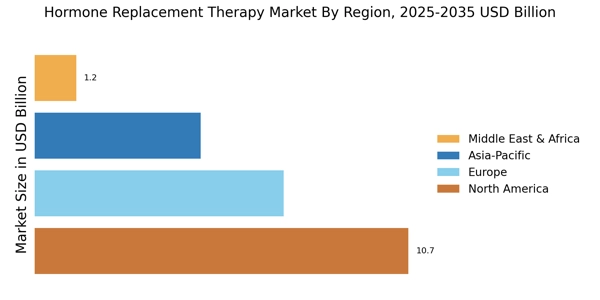Supportive Regulatory Frameworks
Supportive regulatory frameworks are playing a crucial role in the growth of the Hormone Replacement Therapy Market. Governments and health authorities are increasingly recognizing the importance of hormone therapies in managing various health conditions. This recognition has led to the establishment of guidelines and policies that facilitate the approval and accessibility of hormone replacement products. Moreover, regulatory bodies are actively promoting research and development in this field, which is likely to result in the introduction of new and innovative therapies. As a consequence, the Hormone Replacement Therapy Market is expected to benefit from a more favorable regulatory environment that encourages investment and innovation.
Rising Incidence of Hormonal Disorders
The rising incidence of hormonal disorders is a critical factor propelling the Hormone Replacement Therapy Market. Conditions such as hypothyroidism, polycystic ovary syndrome, and menopause-related symptoms are becoming increasingly prevalent, necessitating effective treatment solutions. According to recent estimates, millions of individuals are affected by these disorders, leading to a heightened demand for hormone replacement therapies. This trend is particularly pronounced among aging populations, where hormonal changes are more common. Consequently, healthcare providers are focusing on offering comprehensive treatment plans that include hormone replacement options, thereby driving growth within the Hormone Replacement Therapy Market.
Increasing Awareness of Hormonal Health
The rising awareness regarding hormonal health is a pivotal driver for the Hormone Replacement Therapy Market. As individuals become more informed about the implications of hormonal imbalances, there is a growing demand for therapies that address these issues. Educational campaigns and health initiatives have contributed to this awareness, leading to an increase in consultations with healthcare professionals. This trend is particularly evident among women experiencing menopause, where the need for effective management of symptoms has become a priority. Consequently, the Hormone Replacement Therapy Market is witnessing a surge in demand for tailored treatment options that cater to the specific needs of patients, thereby enhancing overall quality of life.
Growing Preference for Personalized Medicine
The growing preference for personalized medicine is reshaping the Hormone Replacement Therapy Market. Patients are increasingly seeking treatments that are tailored to their unique hormonal profiles and health conditions. This shift towards individualized care is prompting healthcare providers to adopt more sophisticated diagnostic tools and treatment protocols. As a result, the Hormone Replacement Therapy Market is witnessing a rise in customized hormone therapies that cater to specific patient needs. This trend not only enhances treatment efficacy but also fosters patient satisfaction, as individuals feel more empowered in their healthcare decisions.
Technological Advancements in Treatment Delivery
Technological advancements in treatment delivery systems are significantly influencing the Hormone Replacement Therapy Market. Innovations such as transdermal patches, subcutaneous implants, and advanced oral formulations have improved the efficacy and convenience of hormone therapies. These developments not only enhance patient compliance but also minimize side effects associated with traditional methods. For instance, the introduction of bioidentical hormones has gained traction, as they are perceived to be more compatible with the human body. As a result, the Hormone Replacement Therapy Market is likely to expand, driven by the increasing adoption of these advanced delivery systems that promise better therapeutic outcomes.
.png)

















